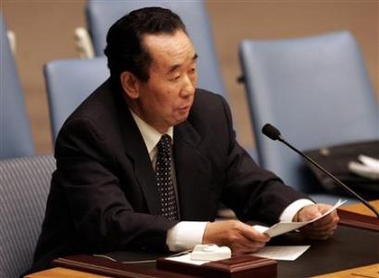Asia-Pacific
North Korea rejects UN limited sanctions
(Agencies/chinadaily.com.cn)
Updated: 2006-07-16 10:26
 |
Large Medium Small |
The UN Security Council voted on Saturday to impose limited sanctions on North Korea for its missile tests, and demanded the country suspend its ballistic missile program.
 Pak Gil Yon, North Korea's Ambassador to the United Nations (U.N.) speaks to the U.N. Security Council, after the Council voted to unanimously to approve a resolution to impose weapons-related sanctions on North Korea in response to its flurry of missile tests earlier this month, in New York, July 15, 2006.[Reuters] |
North Korea immediately rejected the resolution and vowed to launch more missiles, the Associated Press reported.
The resolution adopted Saturday by a 15-0 vote states that the Security Council was "acting under its special responsibility for the maintenance of international peace and security."
U.S. Ambassador John Bolton said North Korea set "a world record" for a rejection - 45 minutes after its adoption - and warned that Pyongyang's failure to comply could lead to further council action. He did not say what that might be.
The resolution bans all UN member states from selling material or technology for missiles or weapons of mass destruction to North Korea, and from receiving missiles, banned weapons or technology from Pyongyang.
It criticized Pyongyang's multiple missile launches on July 5 and demanded it suspend all activities related to its ballistic missile program" and re-establish a moratorium on missile launches. It strongly urges North Korea to return to six-party talks on its nuclear program, which have been stalled since last September.
North Korea's UN Ambassador, Pak Gil Yon, made a rare appearance in the Security Council chamber for the vote. Speaking afterward, he accused the council of "unjustifiable and gangster-like" action aimed at isolating his country, known officially as the Democratic People's Republic of Korea, or DPRK.
"The delegation of the Democratic People's Republic of Korea resolutely condemns the attempt of some countries to misuse the Security Council for the despicable political aim to isolate and put pressure on the DPRK, and totally rejects the resolution," he said.
The Korean People's Army "will go on with missile launch exercises as part of its efforts to bolster deterrent for self-defense in the future," he said.
Pak stressed that Pyongyang has a legal right to test missiles and said it would be foolish to give advance warning because the United States and the DPRK are still technically at war and the US has threatened to intercept North Korean missiles "with the collusion of Japan."
Pak warned that North Korea will "take stronger physical actions of other forms should any other country ... take issue with the exercises and put pressure."
Japan initiated the resolution and its vice minister for foreign affairs, Shintaro Ito, told the Security Council it had "acted swiftly and robustly in response to the reckless and condemnable act of the Democratic People's Republic of Korea”.
Ito said missile launches off his country's coast posed "a direct threat to the security of Japan and other countries."
But until the end the council was split over whether the resolution would be adopted under Chapter 7 of the UN Charter, which makes it mandatory and allows for military force if another specific resolution is adopted.
China had threatened to veto the measure if Chapter 7 were mentioned, recalling the US-led invasion of Iraq that did not receive UN Security Council authorization.
Consequently, Japan, the United States, Britain and France had no choice but to drop the phrase. But they still considered the language of the resolution tough and legally binding.
Instead of Chapter 7, Britain worked out a compromise that said the Security Council was "acting under its special responsibility for the maintenance of international peace and security."
In his council address, Bolton told North Korea to "suspend your ballistic missile program; stop your procurement of materials related to weapons of mass destruction, and implement your September, 2005 commitment to verifiably dismantle your nuclear weapons and existing nuclear programs."
China's U.N. Ambassador Wang Guangya said that Beijing was greatly concerned by the missile launches but urged nations not to add to tensions on the Korean peninsula.